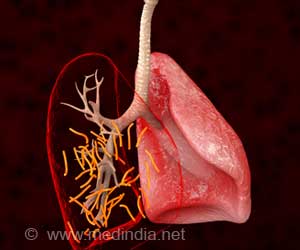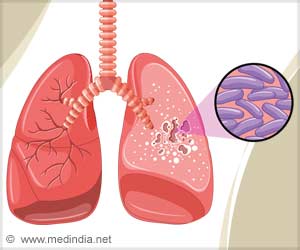The immune system of smokers with chronic lung diseases can backfire, and actually worsen their condition, according to new University of Cincinnati (UC) research.
A University of Cincinnati (UC) research has found that the immune system may play spoilsport when it comes to smokers' healths. The system meant to protect the body can actually backfire and worsen the condition of smokers with chronic lung diseases.
In the pre-clinical study, UC environmental health scientists found that activation of a specific cellular receptor (NKG2D) critical to immune system activation is linked with cigarette smoke.This association could worsen one of the most difficult-to-treat respiratory diseases: chronic obstructive pulmonary disorder (COPD), said the researchers.
They said that the finding was key to understanding COPD disease progression, and developing future interventional drug therapies.
"People have historically believed that if you smoke, you suppress the immune system. We've shown that you actually activate certain parts of the immune system and it could potentially work against you," said Dr. Michael Borchers, lead investigator of the study and UC assistant professor of environmental health.
COPD is a progressive pulmonary disease believed to be caused by long-term cigarette smoking, and is characterised by emphysema and severe inflammation of the lung tissue.
It was found in earlier research that immune cells (lymphocytes) contributed to chronic inflammation, a key indicator of COPD, but it was unclear whether this caused extensive cellular damage.
Advertisement
They hypothesized that when tissue was damaged, the cells would send signals to the immune system indicating they are transformed-similar to cancer or virally infected cells-and must be destroyed.
Advertisement
The method was repeated and cross-referenced in tissue samples from a human cohort that included non-smokers, smokers with COPD and smokers who did not develop COPD.
In patients who had never smoked, there was a complete absence of the NKG2D signal. Current and former smokers who developed the disease expressed signals that correlated with severe COPD disease.
Thus, they concluded that cigarette smoke set off a molecular chain of events resulting in activation of a specific receptor-NKG2D-in lung cells, causing the immune system to attack stressed (damaged) lung tissue.
"Our study is evidence that when the lungs are exposed to chronic damage from cigarette smoke, at some point that damage exceeds the body's natural ability to repair tissue and can start to contribute to COPD instead of protecting against it," said Borchers.
The researchers report their findings in the March 2009 issue of the Journal of Clinical Investigation.
Source-ANI
TAN/L















